|
During our visit to Machaca Hill Lodge (see related article), we visited two extremely interesting
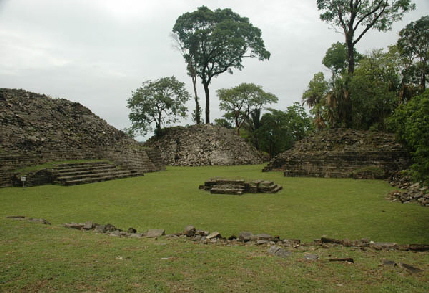 Mayan ruins. We were fortunate that Wilfred Mutrie, our personal professional guide assigned to us by the lodge, was so
knowledgeable about each of the sites. His interpretations of the various archaeological features of each site was very insightful. Mayan ruins. We were fortunate that Wilfred Mutrie, our personal professional guide assigned to us by the lodge, was so
knowledgeable about each of the sites. His interpretations of the various archaeological features of each site was very insightful.
Lubaantun
While not at the top of the list of the more popular and well-known ruins, Lubaantun offers a unique perspective into the Mayan culture. The pre-Columbian
ruined city of the Maya civilization is only 26 miles from the town of Punta Gorda.
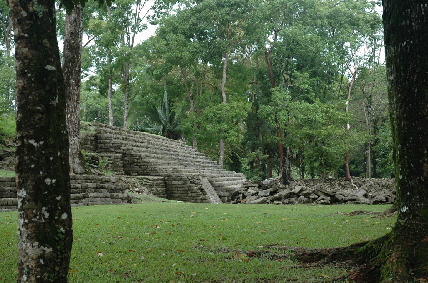 The ruins of Lubantuun are situated on a tall ridge above a valley between two branches of the Columbia
River. From the parking lot, a grassy trail runs about 65 yards on a steep downhill walk to a small bridge over a creek then continues another 45 yards on a steep uphill climb to the
visitor center. The building houses many of the artifacts and figurines found since the place was discovered in early 1900's. The ruins of Lubantuun are situated on a tall ridge above a valley between two branches of the Columbia
River. From the parking lot, a grassy trail runs about 65 yards on a steep downhill walk to a small bridge over a creek then continues another 45 yards on a steep uphill climb to the
visitor center. The building houses many of the artifacts and figurines found since the place was discovered in early 1900's.
Lubaantun's architecture is unique to the region of the Southern Maya Lowlands. The
Mayans selected natural hills and created terraces and retaining walls. The limestone blocks were
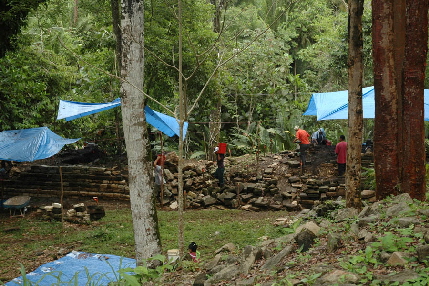 carved and perfectly fitted without the use of mortar. The corners of many of the step-pyramids
were often rounded, and the lack of stone arches at the very top of the pyramids indicates they had structures of pole and thatch in ancient times. However, due to earthquakes primarily,
many of the structures are now rubble and little has been excavated in the majority of them. In fact, thanks to modern-day satellite imagery, only a very small part of the city
has even been found as many of the surrounding hills show signs of structures underneath the earth. carved and perfectly fitted without the use of mortar. The corners of many of the step-pyramids
were often rounded, and the lack of stone arches at the very top of the pyramids indicates they had structures of pole and thatch in ancient times. However, due to earthquakes primarily,
many of the structures are now rubble and little has been excavated in the majority of them. In fact, thanks to modern-day satellite imagery, only a very small part of the city
has even been found as many of the surrounding hills show signs of structures underneath the earth.
The original name of this site has been lost to history. The name Lubaantun - meaning
"place of fallen stones" in Mopa-Yucatec Maya, was adopted in the early 1900's. In addition to its unique architecture, the site is known for its mass
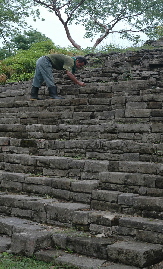
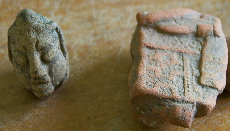 manufacturing of ceramic whistle figurines. The figurines often portray ballplayers with plumes or feathered head gear, a glove-like wrist protector, thick waist
and hip padding and knee pads. The location between two branches of a major river, added to the large amount of figurines and the molds used to make them indicate the Mayans mass-manufactured the
figurines for export to other Mayan locations throughout the region. manufacturing of ceramic whistle figurines. The figurines often portray ballplayers with plumes or feathered head gear, a glove-like wrist protector, thick waist
and hip padding and knee pads. The location between two branches of a major river, added to the large amount of figurines and the molds used to make them indicate the Mayans mass-manufactured the
figurines for export to other Mayan locations throughout the region.
Lubaantun is also unique because of its three ball courts, with local speculation that it was possibly a Maya athletic training
center or stadium. During our visit, the place exuded mystery. You are free to walk around on your own, and it is not unusual to be the only visitor
exploring the ruins. We were fortunate that an excavation was actually in progress during out visit. Unfortunately, their excavation was cordoned off (sort of like a crime
scene) and we were unable to speak with the archeologists.
There is a small admission fee into the site and, not surprisingly, local women arrived
during the day and displayed their handiwork for sale. You can't get much closer to authentic than this location.
Nim Li Punit
Not far from Lubaantun is yet another site which, in itself, is also most unique. This
location was a residence for a royal family. Unlike Lubaantun, where dry-stone construction was employed, the stone structures are cemented with Mayan mortar
and the elaborate notched jointing found in Lubaantun is absent in Nim Li Punit.
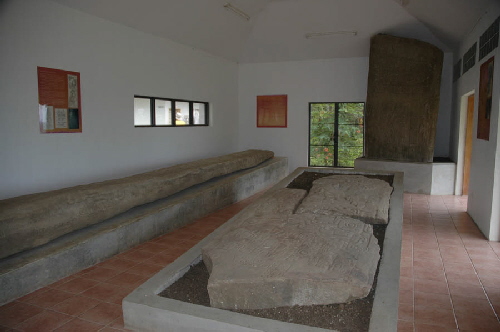 But there is no question that most interesting aspect of this site are the stelae - huge upright stone
slabs intricately carved with information about the ancient political, social, religious and economic systems of the times. But there is no question that most interesting aspect of this site are the stelae - huge upright stone
slabs intricately carved with information about the ancient political, social, religious and economic systems of the times.
Nim Li Punit is home to 26 stone monuments, carefully positioned in the Plaza of the Stelae. This is also home to Stelae 14 - the largest in
Belize and the second largest ever built by the ancient Maya. At just under 30 feet long, the monument was found intact and unbroken. This suggests that it was never raised
or that it was taken down soon after being erected.
The stelae depicts a Nim Li Punit ruler engaged in an offering. His enormous headdress
inspired the name for the site - Nim Li Punit means "big hat" in a Mayan dialect. The stelae also dates itself to October 7, 790 AD. There are also indications of a political
and social connection between this site and Copan in Honduras.
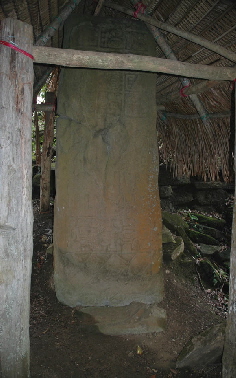
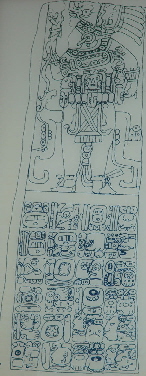 The Plaza of the Stelae also provides insight into the Mayans' interest in astronomy. Several of the monuments mark the
location of solstices and equinoxes. Many of the slabs are covered with thatched roofs in an effort to preserve them in their original placement, while many other slabs have long ago fallen
due to earthquakes or old age and sit on the ground, reminiscent of their size. A cone marker sits in what would have been the center of the plaza in those times (trees and other
vegetation have grown in what would have originally been an open plaza). The Plaza of the Stelae also provides insight into the Mayans' interest in astronomy. Several of the monuments mark the
location of solstices and equinoxes. Many of the slabs are covered with thatched roofs in an effort to preserve them in their original placement, while many other slabs have long ago fallen
due to earthquakes or old age and sit on the ground, reminiscent of their size. A cone marker sits in what would have been the center of the plaza in those times (trees and other
vegetation have grown in what would have originally been an open plaza).
The tombs of the royal family have also been found and excavated, and now sit open atop one of the hills overlooking the Plaza. As with
Lubantuun, visitors can wander around on their own, often undisturbed by others. We will go back and visit some of the other nearby ruins and Mayan cities in this extremely
interesting area on the southern end of Belize, and of course, we'll have our favorite Machaca Hill guide, Wilfred, along with us!
For more information on the rainforest canopy lodge, Machaca Hill, and all the nearby
Mayan sites and the multitude of other guest activities, contact info@machacahill.com, visit their website at www.machacahill.com or call 011-501-722-0050.
|